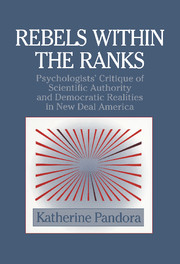 Rebels within the Ranks
Rebels within the Ranks Book contents
- Frontmatter
- Contents
- Acknowledgments
- Introduction
- 1 The Deep Context of Dissent: Jamesian Philosophy and Social Gospel Theology
- 2 Challenging the Rules of the Game
- 3 Defying the Law of Averages: Constructing a Science of Individuality
- 4 The Pursuit of “Impure” Science: Constructing a Science of Social Life
- 5 Natural History and Psychological Habitats
- 6 Exploratory Relativism and Patterns of Possibility
- Conclusions
- Notes
- Index
6 - Exploratory Relativism and Patterns of Possibility
Published online by Cambridge University Press: 06 October 2009
- Frontmatter
- Contents
- Acknowledgments
- Introduction
- 1 The Deep Context of Dissent: Jamesian Philosophy and Social Gospel Theology
- 2 Challenging the Rules of the Game
- 3 Defying the Law of Averages: Constructing a Science of Individuality
- 4 The Pursuit of “Impure” Science: Constructing a Science of Social Life
- 5 Natural History and Psychological Habitats
- 6 Exploratory Relativism and Patterns of Possibility
- Conclusions
- Notes
- Index
Summary
The recognition of cultural relativity carries with it its own values, which need not be those of the absolutist philosophies. It challenges customary opinions and causes those who have been bred to them acute discomfort. It rouses pessimism because it throws old formulas into confusion, not because it contains anything intrinsically difficult.
Ruth Benedict (1934)Debates over the place of science in the American democracy turned in large part on the meanings invested in the terms “science” and “democracy” by the participants. As I have discussed in the preceding chapters, Allport's and the Murphys' definitions of science contained assumptions that placed their views at odds with those of their colleagues. So, too, with their understandings of democracy: if Allport and the Murphys agreed with many of their contemporaries as to what the social, political, and economic facts of democratic life were, their interpretation of what these facts signified could diverge sharply. This was especially true in regard to whether or not the general public could be trusted with the responsibilities required of a democratic citizenry. From within the radically progressive political framework of these scientists' views, the idea of “social control” meant the regulation of economic elites by the public; for many of their peers, the idea of “social control” meant the regulation of an irrational public by administrative elites.
At issue was the question of how far the nation had progressed in its quest to become a truly democratic polity. Activists such as Allport and the Murphys belonged among those who believed that American democracy was to be defined as an aspiration yet to be reached as opposed to a goal that had already been achieved.
- Type
- Chapter
- Information
- Rebels within the RanksPsychologists' Critique of Scientific Authority and Democratic Realities in New Deal America, pp. 152 - 176Publisher: Cambridge University PressPrint publication year: 1997
